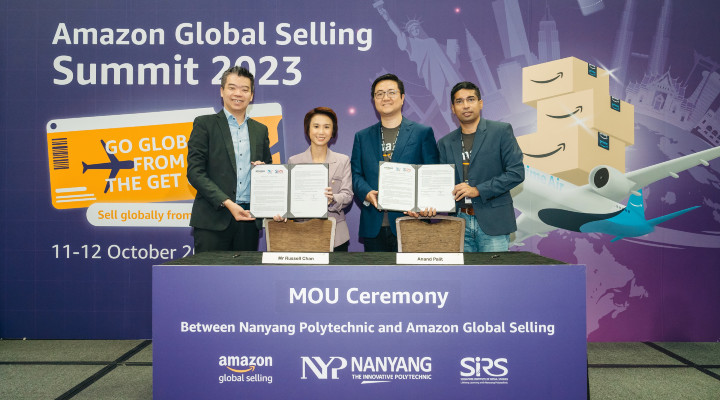In a move that sets the stage for a dramatic surge in cross-border e-commerce, Amazon Global Selling Singapore has rolled out its ambitious 2024 strategic blueprint and signed a memorandum of understanding with Nanyang Polytechnic’s Singapore Institute of Retail Studies (NYP-SIRS). The partnership promises to supercharge the global aspirations of Singaporean entrepreneurs and small business owners, equipping them with vital skills and resources to tap into international markets. As
As Southeast Asia rapidly cements its position as an e-commerce powerhouse, the collaboration emerges as a strategic pivot point, one aimed at harnessing the region’s untapped commercial potential.
In an exclusive interview, Anand Palit, head of Amazon Global Selling, Southeast Asia, opens up about the mission, the challenges, and the grand vision that aims to place local brands on the global e-commerce map.
The story so far
The theme of this year’s Global Selling Summit is ‘Go global from the get go’, which was partly inspired by feedback from sellers, according to Palit. The main goal of the event is to provide sellers with the mindset required to take their businesses to the next level.
“We are essentially here to expand e-commerce opportunities for brands, sellers and entrepreneurs via a company that has all the necessary support and tools that can build every stage of their formative journey in the global marketplace,” he told Inside Retail.
Palit said that Amazon is strategically very interested in supporting and growing businesses in Southeast Asia. From his point of view, raising awareness of cross-border e-commerce is of paramount importance.
“Focusing on making sure brands, sellers and entrepreneurs understand the seller journey is a key component of what we do. Our summit is an important milestone for sellers to understand the value proposition we bring to the table,” he said.
Palit agreed that Southeast Asia represents an opportunity for brands, sellers and entrepreneurs, and noted that there is a lot of enthusiasm in the marketplace. He believes that Amazon can act as a springboard for these companies to become multi-country enterprises and grow their business exponentially.
B2C e-commerce opportunities
Singapore firms generated S$1.7 billion from overseas B2C e-commerce sales in 2022, and this number has the potential to double to S$3.9 billion by 2027, if firms invest in cross-border e-commerce.
These were findings of a recently launched study, Local Sellers, Global Consumers: Capturing the e-commerce export opportunity in Singapore’, which surveyed over 300 micro, small and medium enterprises (MSMEs) in Singapore.
According to the survey, 82 per cent of MSMEs believe that without e-commerce, they would not be able to export their product offerings. They also highly value the digital features that come with e-commerce, as they facilitate their access to foreign countries and simplify interactions with international consumers.
Still, MSMEs have identified some barriers to using e-commerce to export overseas, namely costs and regulatory issues.
While there are many favourable policies and initiatives in place to develop e-commerce activity in Singapore, MSMEs would like to see further support to address the high costs of cross-border logistics as well as greater regulatory support on digital trade.
“We have seen strong double-digit growth in Southeast Asia in terms of cross border e-commerce and this just adds to our belief that this marketplace will continue to grow in the future,” Palit said.
Strategic priorities
Through Amazon Global Selling, businesses in Singapore and Southeast Asia could, theoretically, enter over 200 countries and territories and reach more than 300 million customers.
And Palit is focused on ensuring that more local businesses are aware of that opportunity.
“The first thing is that we can leverage Amazon’s global infrastructure as a major advantage. We can offer same day or next day delivery to over 60 of the biggest metro areas in the US, so that’s a big factor,” he said
The company also has dedicated teams that provide training to sellers on aspects such as intellectual property rights, logistics and regulatory compliance.
“We have also partnered with Enterprise Singapore and the Singapore Business Federation to provide account management support to a set of locally identified entrepreneurs and businesses,” Palit explained.
Ultimately, he is very confident about the state of cross border e-commerce in Southeast Asia. He is seeing great interest from sellers who are itching to embark on a journey to make their businesses global, and this only bodes well for the future of the region as a whole.



